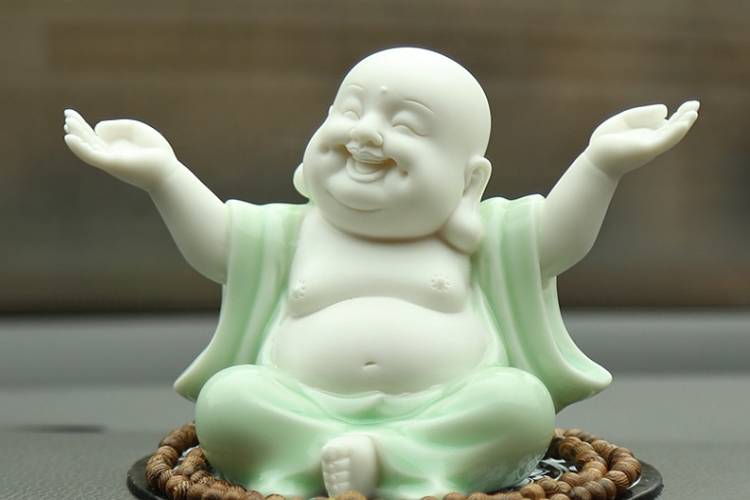In Buddhism, Mudita refers to the empathetic joy one experiences in seeing others happy, or in doing good deeds without expecting anything in return. It is also considered one of the Four Immeasurables (Brahma-viharas) of enlightened beings.
Although joy and happiness are positive emotions that everyone experiences in life, they are often conditioned by external factors. For instance, we may feel happy when we receive a gift or when someone expresses love towards us. However, even when we see others experiencing happiness, we may still feel a tinge of jealousy deep within.
This tendency is especially evident in our interactions on social media, where the “like” button can serve to conceal the jealousy we feel inside. It is essential to be honest with ourselves and examine our thoughts and motivations when engaging with social media.
In this article, LotusBuddhas will delve into the concept of “unconditional joy” or “empathetic joy” in Buddhism, and how cultivating this state of mind can lead to greater personal and spiritual growth.
Meaning of mudita in Buddhism

Mudita is a term used in Buddhism that refers to a feeling of sympathetic or empathetic joy. It is one of Four Divine Abodes (Brahmaviharas) in Buddhist philosophy, alongside metta (loving-kindness), karuna (compassion) and upekkha (equanimity).
Mudita is the practice of taking joy in the happiness and success of others, without feeling envy or jealousy. It is the opposite of schadenfreude, which is taking pleasure in the misfortune of others. Practicing mudita helps to cultivate a sense of interconnectedness with others and fosters a sense of goodwill and generosity.
Those who practice mudita tend to perform altruistic acts for the greater good, which naturally includes themselves. It is challenging to take pleasure in actions that result in harm to oneself.
Certain individuals believe that mudita is an inherent quality present within every person, and its advantages can be experienced by all. This joy can be shared with those in close proximity.
In essence, mudita encourages practitioners to develop a mindset of happiness for the success of others, as if it were their own success. This practice is often used as a counterbalance to negative emotions such as jealousy and envy, and it is believed to promote inner peace, joy and contentment.
The opposite of mudita
As shared above, the opposite of mudita in Buddhism is schadenfreude, which is a German term that describes the feeling of pleasure or joy derived from the misfortunes of others. Schadenfreude is considered to be a negative emotion and is often associated with envy, resentment, and a lack of compassion.
While mudita is the practice of taking joy in the happiness and success of others, without feeling envy or jealousy, schadenfreude is the opposite, where one derives pleasure from the pain or misfortune of others. It is important to note that schadenfreude is not a desirable or beneficial emotion, as it can lead to feelings of bitterness, animosity and ill-will towards others. Therefore, the practice of mudita is encouraging in Buddhism to promote compassion, interconnectedness and a sense of goodwill towards others.
Benefits of practicing mudita
Practicing mudita has significant benefits that can have transformative effects on both individuals and society. This concept moves beyond the sphere of self-centric emotions and encourages an expansive, empathetic outlook towards others’ successes.
Enhanced emotional well-being: One of the most notable benefits of practicing mudita is enhanced emotional well-being. By consciously choosing to rejoice in others’ happiness, individuals can elevate their own emotional state, thereby reducing feelings of envy, resentment and bitterness. Over time, this practice can foster a healthier emotional outlook, leading to improved mood, increased positivity and overall emotional resilience.
Improved relationships: The practice of mudita can also significantly enhance interpersonal relationships. When one takes joy in others’ successes, it creates a foundation of mutual respect, admiration, and positivity, thereby strengthening bonds. By reducing feelings of jealousy and competitiveness, mudita encourages a more harmonious interaction, fostering a supportive, understanding and compassionate environment.
Increased empathy: Practicing mudita can lead to increased empathy. It encourages understanding others’ perspectives and recognizing the interconnected nature of our lives. When one rejoices in the success of others, it deepens the understanding of shared human experiences, leading to greater empathy and compassion. This empathy can lead to more humane responses to the challenges faced by others.
Promotion of altruistic behavior: Mudita promotes altruistic behavior. Joy at others’ success encourages cooperative and supportive actions, as it fosters a mindset that is oriented towards the collective good rather than just personal gain. This shift in outlook can spur altruistic behaviors, such as volunteering, helping, and sharing, thereby benefiting society at large.
Increased psychological resilience: Mudita can increase psychological resilience. It fosters an ability to derive joy from a wide range of sources, not just personal achievements or material possessions. This broadened perspective can enhance psychological resilience, helping individuals to maintain positivity and balance even during challenging times.
Reduced stress and anxiety: Lastly, practicing mudita can help reduce stress and anxiety. By redirecting focus from self-centric concerns and worries towards empathetic joy, individuals can experience a reduction in anxiety and stress. The practice of mudita can thus serve as an effective tool for stress management and overall mental health.
How to cultivate mudita in daily life

Despite its powerful potential to nurture interpersonal relations and build harmonious societies, mudita is often overshadowed by its counterparts — metta (loving-kindness), karuna (compassion), and upekkha (equanimity). However, cultivating mudita in everyday life can be transformative.
Mindful awareness: The journey of cultivating mudita begins with mindful awareness. This requires conscious effort to acknowledge one’s natural responses to the success and happiness of others. Paying attention to these feelings may reveal elements of envy, resentment, or jealousy, which are obstacles to the manifestation of mudita. By mindfully observing these emotions without judgment, individuals can develop a deeper understanding of their origins and learn to disengage from them, making room for genuine empathetic joy.
Reflection: Regular reflection is another potent tool for fostering mudita. Reflecting on the impermanent and interconnected nature of life can help individuals understand that one person’s happiness does not diminish another’s. Indeed, as Buddhist philosophy underscores, joy is not a finite resource but one that can be mutually shared and amplified. Such reflection often leads to the dissolution of envy and jealousy, thereby fostering mudita.
Meditation: Practicing mudita meditation can also be instrumental in fostering this virtue. This involves focusing on individuals — loved ones, neutral individuals, and even those with whom one has difficult relations, and consciously cultivating feelings of joy for their happiness and successes. Regular practice of mudita meditation can gradually shift unconscious patterns of thinking and emotional responses, making empathetic joy a more natural response.
Gratitude: Cultivating gratitude is another practical strategy for nurturing mudita. By focusing on one’s blessings, individuals can foster a sense of abundance and contentment, reducing the propensity to compare themselves with others. As they cultivate contentment with their own circumstances, individuals are more likely to celebrate the joy and success of others, thereby nurturing mudita.
Active celebration: Lastly, actively celebrating the happiness and achievements of others, whether through verbal expressions or tangible actions, can cultivate mudita. Such actions reinforce positive behavior and condition the mind to respond with joy rather than envy or resentment.
In a world marked by competition and comparison, it can be challenging to foster a mindset of mudita. However, once the benefits of empathetic joy are realized, its value will be appreciated. Through mudita meditation, one can hone their ability to love others, recognizing the interconnectedness of all things in supporting each other to survive and thrive. This is why mudita is also known as “non-self joy” or “unconditional joy”.
Mudita serves as a strong foundation for the development of other noble qualities and is essential for achieving enlightenment. Without mudita, progress on the Buddhist path is difficult to attain, even in isolated settings such as the mountains. Negative seeds persist, and true liberation is only achieved through confronting and training the mind amidst challenges.
Looking at the life of Shakyamuni Buddha, one can observe that he did not shy away from afflictions or suffering, nor did he renounce the world. He faced a society full of injustice and challenges, working towards its transformation. Life, relationships, and societal challenges are indicative of where one stands on the path to enlightenment.





